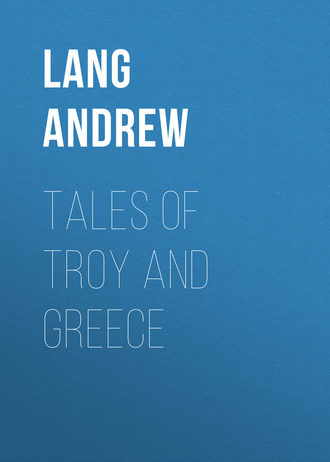
Lang Andrew
Tales of Troy and Greece
V
HERALDS COME FOR TRIBUTE
The days and weeks went by, and Theseus reigned with his father in peace. The chief men came to Athens from the little towns in the country, and begged Theseus to be their lord, and they would be his men, and he would lead their people if any enemy came up against them. They would even pay tribute to be used for buying better arms, and making strong walls, and providing ships, for then the people of Athens had no navy. Theseus received them courteously, and promised all that they asked, for he did not know that soon he himself would be sent away as part of the tribute which the Athenians paid every nine years to King Minos of Crete.
Though everything seemed to be peaceful and happy through the winter, yet Theseus felt that all was not well. When he went into the houses of the town's people, where all had been merry and proud of his visits, he saw melancholy, silent mothers, and he missed the young people, lads and maidens. Many of them were said to have gone to visit friends in far-away parts of Greece. The elder folk, and the young people who were left, used to stand watching the sea all day, as if they expected something strange to come upon them from the sea, and Ægeus sat sorrowful over the fire, speaking little, and he seemed to be in fear.
Theseus was disturbed in his mind, and he did not choose to put questions to Ægeus or to the townsfolk. He and Medea were great friends, and one day when they were alone in her chamber, where a fragrant fire of cedar wood burned, he told her what he had noticed. Medea sighed, and said: 'The curse of the sons of Pallas is coming upon the people of Athens – such a curse and so terrible that not even you, Prince Theseus, can deal with it. The enemy is not one man or one monster only, but the greatest and most powerful king in the world.'
'Tell me all,' said Theseus, 'for though I am but one man, yet the ever-living gods protect and help me.'
'The story of the curse is long,' said Medea. 'When your father Ægeus was young, after he returned to Athens from Troezene, he decreed that games should be held every five years, contests in running, boxing, wrestling, foot races, and chariot races. Not only the people of Athens, but strangers were allowed to take part in the games, and among the strangers came Androgeos, the eldest son of great Minos, King of Cnossos, in the isle of Crete of the Hundred Cities, far away in the southern sea. Minos is the wisest of men, and the most high god, even Zeus, is his counsellor, and speaks to him face to face. He is the richest of men, and his ships are without number, so that he rules all the islands, and makes war, when he will, even against the King of Egypt. The son of Minos it was who came to the sports with three fair ships, and he was the strongest and swiftest of men. He won the foot race, and the prizes for boxing and wrestling, and for shooting with the bow, and throwing the spear, and hurling the heavy weight, and he easily overcame the strongest of the sons of Pallas.
'Then, being unjust men and dishonourable, they slew him at a feast in the hall of Ægeus, their own guest in the king's house they slew, a thing hateful to the gods above all other evil deeds. His ships fled in the night, bearing the news to King Minos, and, a year after that day, the sea was black with his countless ships. His men landed, and they were so many, all glittering in armour of bronze, that none dared to meet them in battle. King Ægeus and all the elder men of the city went humbly to meet Minos, clad in mourning, and bearing in their hands boughs of trees, wreathed with wool, to show that they came praying for mercy. "Mercy ye shall have when ye have given up to me the men who slew my son," said Minos. But Ægeus could not give up the sons of Pallas, for long ago they had fled in disguise, and were lurking here and there, in all the uttermost parts of Greece, in the huts of peasants. Such mercy, then, the Athenians got as Minos was pleased to give. He did not burn the city, and slay the men, and carry the women captives. But he made Ægeus and the chief men swear that every nine years they would choose by lot seven of the strongest youths, and seven of the fairest maidens, and give them to his men, to carry away to Crete. Every nine years he sends a ship with dark sails, to bear away the captives, and this is the ninth year, and the day of the coming of the ship is at hand. Can you resist King Minos?'
'His ship we could burn, and his men we could slay,' said Theseus; and his hand closed on the hilt of his sword.
'That may well be,' said Medea, 'but in a year Minos would come with his fleet and his army, and burn the city; and the other cities of Greece, fearing him and not loving us, would give us no aid.'
'Then,' said Theseus, 'we must even pay the tribute for this last time; but in nine years, if I live, and the gods help me, I shall have a fleet, and Minos must fight for his tribute. For in nine years Athens will be queen of all the cities round about, and strong in men and ships. Yet, tell me, how does Minos treat the captives from Athens, kindly or unkindly?'
'None has ever come back to tell the tale,' said Medea, 'but the sailors of Minos say that he places the captives in a strange prison called the Labyrinth. It is full of dark winding ways, cut in the solid rock, and therein the captives are lost and perish of hunger, or live till they meet a Thing called the Minotaur. This monster has the body of a strong man, and a man's legs and arms, but his head is the head of a bull, and his teeth are the teeth of a lion, and no man may deal with him. Those whom he meets he tosses, and gores, and devours. Whence this evil beast came I know, but the truth of it may not be spoken. It is not lawful for King Minos to slay the Horror, which to him is great shame and grief; neither may he help any man to slay it. Therefore, in his anger against the Athenians he swore that, once in every nine years, he would give fourteen of the Athenian men and maidens to the Thing, and that none of them should bear sword or spear, dagger or axe, or any other weapon. Yet, if one of the men, or all of them together, could slay the monster, Minos made oath that Athens should be free of him and his tribute.'
Theseus laughed and stood up. 'Soon,' he said, 'shall King Minos be free from the Horror, and Athens shall be free from the tribute, if, indeed, the gods be with me. For me need no lot be cast; gladly I will go to Crete of my free will.'
'I needed not to be a prophetess to know that you would speak thus,' said Medea. 'But one thing even I can do. Take this phial, and bear it in your breast, and, when you face the Minotaur, do as I shall tell you.' Then she whispered some words to Theseus, and he marked them carefully.
He went forth from Medea's bower; he walked to the crest of the hill upon which Athens is built, and there he saw all the people gathered, weeping, and looking towards the sea. Swiftly a ship with black sails was being rowed towards the shore, and her sides shone with the bronze shields of her crew, that were hung on the bulwarks.
'My friends,' cried Theseus, 'I know that ship, and wherefore she comes, and with her I shall sail to Crete and slay the Minotaur. Did I not slay Sinis and Sciron, Cercyon and Procrustes, and Periphetes? Let there be no drawing of lots. Where are seven men and seven maidens who will come with me, and meet these Cretans when they land, and sail back with them, and see this famous Crete, for the love of Theseus?'
Then there stepped forth seven young men of the best of Athens, tall, and strong, and fair, the ancestors of them who smote, a thousand years afterwards, the Persians at Marathon and in the strait of Salamis. 'We will live or die with you, Prince Theseus,' they said.
Next, one by one, came out of the throng, blushing, but with heads erect and firm steps, the seven maidens whom the seven young men loved. They, too, were tall, and beautiful, and stately, like the stone maidens called Caryatides who bear up the roofs of temples.
'We will live and die with you, Prince Theseus, and with our lovers,' they cried; and all the people gave such a cheer that King Ægeus heard it, and came from his palace, leaning on his staff, and Medea walked beside him.
'Why do you raise a glad cry, my children?' said Ægeus. 'Is not that the Ship of Death, and must we not cast lots for the tribute to King Minos?'
'Sir,' said Theseus, 'we rejoice because we go as free folk, of our own will, these men and maidens and I, to take such fortune as the gods may give us, and to do as well as we may. Nay, delay us not, for from this hour shall Athens be free, without master or lord among Cretan men.'
'But, my son, who shall defend me, who shall guide me, when I have lost thee, the light of mine eyes, and the strength of my arm?' whimpered Ægeus.
'Is the king weeping alone, while the fathers and mothers of my companions have dry eyes?' said Theseus. 'The gods will be your helpers, and the lady who is my friend, and who devised the slaying of the sons of Pallas. Hers was the mind, if the hand was my own, that wrought their ruin. Let her be your counsellor, for no other is so wise. But that ship is near the shore, and we must go.'
Then Theseus embraced Ægeus, and Medea kissed him, and the young men and maidens kissed their fathers and mothers, and said farewell. With Theseus at their head they marched down the hill, two by two; but Medea sent after them chariots laden with changes of raiment, and food, and skins of wine, and all things of which they had need. They were to sail in their own hired ship, for such was the custom, and the ship was ready with her oarsmen. But Theseus and the Seven, by the law of Minos, might carry no swords or other weapons of war. The ship had a black sail, but Ægeus gave to the captain a sail dyed scarlet with the juice of the scarlet oak, and bade him hoist it if he was bringing back Theseus safe, but, if not, to return under the black sail.
The captain, and the outlook man, and the crew, and the ship came all from the isle of Salamis, for as yet the Athenians had no vessels fit for long voyages – only fishing-boats. As Theseus and his company marched along they met the herald of King Minos, bearing a sacred staff, for heralds were holy, and to slay a herald was a deadly sin. He stopped when he met Theseus, and wondered at his beauty and strength. 'My lord,' said he, 'wherefore come you with the Fourteen? Know you to what end they are sailing?'
'That I know not, nor you, nor any man, but they and I are going to one end, such as the gods may give us,' answered Theseus. 'Speak with me no more, I pray you, and go no nearer Athens, for there men's hearts are high to-day, and they carry swords.'
The voice and the eyes of Theseus daunted the herald, and he with his men turned and followed behind, humbly, as if they were captives and Theseus were conqueror.
VI
THESEUS IN CRETE
After many days' sailing, now through the straits under the beautiful peaks of the mountains that crowned the islands, and now across the wide sea far from sight of land, they beheld the crest of Mount Ida of Crete, and ran into the harbour, where a hundred ships lay at anchor, and a great crowd was gathered. Theseus marvelled at the ships, so many and so strong, and at the harbour with its huge walls, while he and his company landed. A hundred of the guardsmen of Minos, with large shields, and breastplates made of ribs of bronze, and helmets of bronze with horns on them, were drawn up on the pier. They surrounded the little company of Athenians, and they all marched to the town of Cnossos, and the palace of the king.
If Theseus marvelled at the harbour he wondered yet more at the town. It was so great that it seemed endless, and round it went a high wall, and at every forty yards was a square tower with small square windows high up. These towers were exactly like those which you may see among the hills and beside the burns in the Border country, the south of Scotland and the north of England; towers built when England and Scotland were at war. But when they had passed through the gateway in the chief tower, the town seemed more wonderful than the walls, for in all things it was quite unlike the cities of Greece. The street, paved with flat paving stones, wound between houses like our own, with a ground floor (in this there were no windows) and with two or three stories above, in which there were windows, with sashes, and with so many panes to each window, the panes were coloured red. Each window opened on a balcony, and the balconies were crowded with ladies in gay dresses like those which are now worn. Under their hats their hair fell in long plaits over their shoulders: they had very fine white blouses, short jackets, embroidered in bright coloured silk, and skirts with flounces. Laughing merrily they looked down at the little troop of prisoners, chatting, and some saying they were sorry for the Athenian girls. Others, seeing Theseus marching first, a head taller than the tallest guardsman, threw flowers that fell at his feet, and cried, 'Go on, brave Prince!' for they could not believe that he was one of the prisoners.
The crowd in the street being great, the march was stopped under a house taller than the rest; in the balcony one lady alone was seated, the others stood round her as if they were her handmaidens. This lady was most richly dressed, young, and very beautiful and stately, and was, indeed, the king's daughter, Ariadne. She looked grave and full of pity, and, as Theseus happened to glance upwards, their eyes met, and remained fixed on each other. Theseus, who had never thought much about girls before, grew pale, for he had never seen so beautiful a maiden: Ariadne also turned pale, and then blushed and looked away, but her eyes glanced down again at Theseus, and he saw it, and a strange feeling came into his heart.
The guards cleared the crowd, and they all marched on till they came to the palace walls and gate, which were more beautiful even than the walls of the town. But the greatest wonder of all was the palace, standing in a wide park, and itself far greater than such towns as Theseus had seen, Troezene, or Aphidnae, or Athens. There was a multitude of roofs of various heights, endless roofs, endless windows, terraces, and gardens: no king's palace of our times is nearly so great and strong. There were fountains and flowers and sweet-smelling trees in blossom, and, when the Athenians were led within the palace, they felt lost among the winding passages and halls.
The walls of them were painted with pictures of flying fishes, above a clear white sea, in which fish of many kinds were swimming, with the spray and bubbles flying from their tails, as the sea flows apart from the rudder of a ship. There were pictures of bull fights, men and girls teasing the bull, and throwing somersaults over him, and one bull had just tossed a girl high in the air. Ladies were painted in balconies, looking on, just such ladies as had watched Theseus and his company; and young men bearing tall cool vases full of wine were painted on other walls; and others were decorated with figures of bulls and stags, in hard plaster, fashioned marvellously, and standing out from the walls 'in relief,' as it is called. Other walls, again, were painted with patterns of leaves and flowers.
The rooms were full of the richest furniture, chairs inlaid with ivory, gold, and silver, chests inlaid with painted porcelain in little squares, each square containing a separate bright coloured picture. There were glorious carpets, and in some passages stood rows of vases, each of them large enough to hold a man, like the pots in the story of Ali Baba and the Forty Thieves in the Arabian Nights. There were tablets of stone brought from Egypt, with images carved of gods and kings, and strange Egyptian writing, and there were cups of gold and silver – indeed, I could not tell you half the beautiful and wonderful things in the palace of Minos. We know that this is true, for the things themselves, all of them, or pictures of them, have been brought to light, dug out from under ground; and, after years of digging, there is still plenty of this wonderful palace to be explored.
The Athenians were dazzled, and felt lost and giddy with passing through so many rooms and passages, before they were led into the great hall named the Throne Room, where Minos was sitting in his gilded throne that is still standing. Around him stood his chiefs and princes, gloriously clothed in silken robes with jewels of gold; they left a lane between their ranks, and down this lane was led Theseus at the head of his little company. Minos, a dark-faced man, with touches of white in his hair and long beard, sat with his elbow on his knee, and his chin in his hand, and he fixed his eyes on the eyes of Theseus. Theseus bowed and then stood erect, with his eyes on the eyes of Minos.
'You are fifteen in number,' said Minos at last, 'my law claims fourteen.'
'I came of my own will,' answered Theseus, 'and of their own will came my company. No lots were cast.'
'Wherefore?' asked Minos.
'The people of Athens have a mind to be free, O king.'
'There is a way,' said Minos. 'Slay the Minotaur and you are free from my tribute.'
'I am minded to slay him,' said Theseus, and, as he spoke, there was a stir in the throng of chiefs, and priests, and princes, and Ariadne glided through them, and stood a little behind her father's throne, at one side. Theseus bowed low, and again stood erect, with his eyes on the face of Ariadne.
'You speak like a king's son that has not known misfortune,' said Minos.
'I have known misfortune, and my name is Theseus, Ægeus' son,' said Theseus.
'This is a new thing. When I saw King Ægeus he had no son, but he had many nephews.'
'No son that he wotted of,' said Theseus, 'but now he has no nephews, and one son.'
'Is it so?' asked Minos, 'then you have avenged me on the slayers of my own son, fair sir, for it was your sword, was it not, that delivered Ægeus from the sons of Pallas?'
'My sword and the swords of my friends, of whom seven stand before you.'
'I will learn if this be true,' said Minos.
'True!' cried Theseus, and his hand flew to the place where his sword-hilt should have been, but he had no sword.
King Minos smiled. 'You are young,' he said, 'I will learn more of these matters. Lead these men and maidens to their own chambers in the palace,' he cried to his guard. 'Let each have a separate chamber, and all things that are fitting for princes. To-morrow I will take counsel.'
Theseus was gazing at Ariadne. She stood behind her father, and she put up her right hand as if to straighten her veil, but, as she raised her hand, she swiftly made the motion of lifting a cup to the lips; and then she laid on her lips the fingers of her left hand, closing them fast. Theseus saw the token, and he bowed, as did all his company, to Minos and to the princess, and they were led upstairs and along galleries, each to a chamber more rich and beautiful than they had seen before in their dreams. Then each was taken to a bath, they were washed and clothed in new garments, and brought back to their chambers, where meat was put before them, and wine in cups of gold. At the door of each chamber were stationed two guards, but four guards were set at the door of Theseus. At nightfall more food was brought, and, for Theseus, much red wine, in a great vessel adorned with ropes and knobs of gold.
Theseus ate well, but he drank none, and, when he had finished, he opened the door of his chamber, and carried out all the wine and the cup. 'I am one,' he said, 'who drinks water, and loves not the smell of wine in his chamber.'
The guards thanked him, and soon he heard them very merry over the king's best wine, next he did not hear them at all, next – he heard them snoring!
Theseus opened the door gently and silently: the guards lay asleep across and beside the threshold. Something bright caught his eye, he looked up, a lamp was moving along the dark corridor, a lamp in the hand of a woman clad in a black robe; the light fell on her white silent feet, and on the feet of another woman who followed her.
Theseus softly slipped back into his chamber. The light, though shaded by the girl's hand, showed in the crevice between the door and the door-post. Softly entered Ariadne, followed by an old woman that had been her nurse. 'You guessed the token?' she whispered. 'In the wine was a sleepy drug.'
Theseus, who was kneeling to her, nodded.
'I can show you the way to flee, and I bring you a sword.'
'I thank you, lady, for the sword, and I pray you to show me the way – to the Minotaur.'
Ariadne grew pale, and her hand flew to her heart.
'I pray you make haste. Flee I will not, nor, if the king have mercy on us, will I leave Crete till I have met the Minotaur: for he has shed the blood of my people.'
Ariadne loved Theseus, and knew well in her heart that he loved her. But she was brave, and she made no more ado; she beckoned to him, and stepped across the sleeping guardsmen that lay beside the threshold. Theseus held up his hand, and she stopped, while he took two swords from the men of the guard. One was long, with a strong straight narrow blade tapering to a very sharp point; the other sword was short and straight, with keen cutting double edges. Theseus slung them round his neck by their belts, and Ariadne walked down the corridor, Theseus following her, and the old nurse following him. He had taken the swords from the sleeping men lest, if Ariadne gave him one, it might be found out that she had helped him, and she knew this in her heart, for neither of them spoke a word.
Swiftly and silently they went, through galleries and corridors that turned and wound about, till Ariadne came to the door of her own chamber. Here she held up her hand, and Theseus stopped, till she came forth again, thrusting something into the bosom of her gown. Again she led the way, down a broad staircase between great pillars, into a hall, whence she turned, and passed down a narrower stair, and then through many passages, till she came into the open air, and they crossed rough ground to a cave in a hill. In the back of the cave was a door plated with bronze which she opened with a key. Here she stopped and took out of the bosom of her gown a coil of fine strong thread.
'Take this,' she said, 'and enter by that door, and first of all make fast the end of the coil to a stone, and so walk through the labyrinth, and, when you would come back, the coil shall be your guide. Take this key also, to open the door, and lock it from within. If you return place the key in a cleft in the wall within the outer door of the palace.'
She stopped and looked at Theseus with melancholy eyes, and he threw his arms about her, and they kissed and embraced as lovers do who are parting and know not if they may ever meet again.
At last she sighed and said, 'The dawn is near – farewell; the gods be with you. I give you the watchword of the night, that you may pass the sentinels if you come forth alive,' and she told him the word. Then she opened the door and gave him the key, and the old nurse gave him the lamp which she carried, and some food to take with him.







